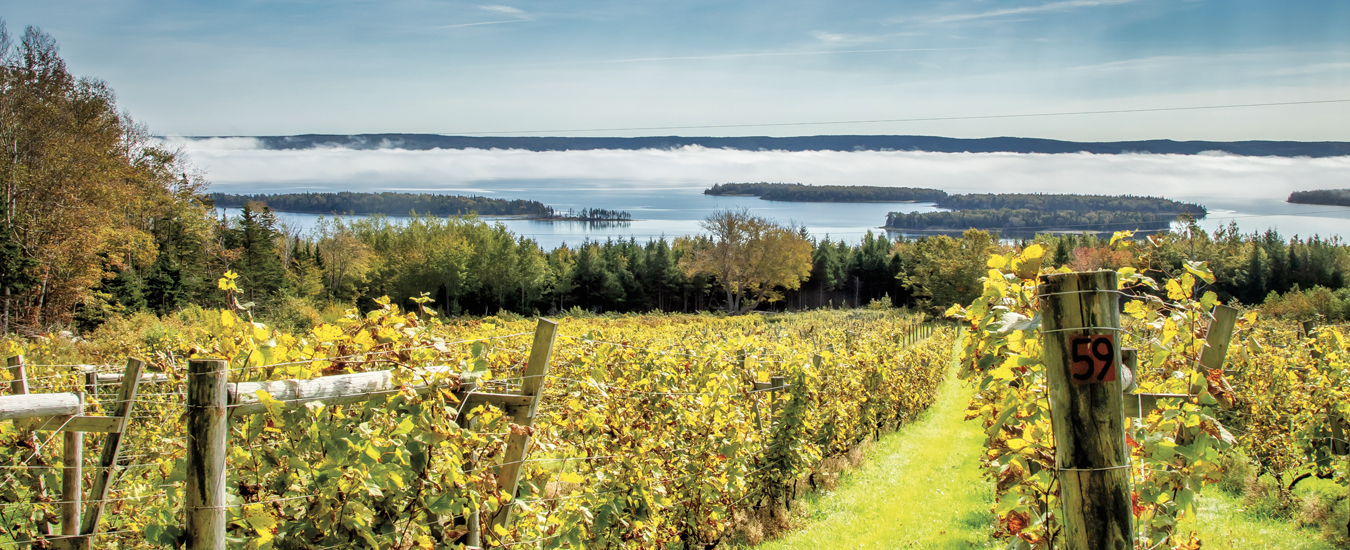In the hills of Cape Breton, an 81-hectare parcel of gently sloping land overlooks Bras d’Or Lake. Neither hiking territory nor pastureland, it’s resplendent with neat rows of grapevines tapering down to the water. It’s not what one would expect in an area with famously harsh winters, but Ken MacLellan is making a go of it. He’s the owner of Eileanan Breagha, Scottish Gaelic for “beautiful islands.” The name is apt. Panoramic seems too trite a word to describe the stunning vistas at Cape Breton’s only winery.
MacLellan, who is from nearby Margaree, first saw the property in his late 20s. It was for sale, and he was immediately smitten. He went to Alberta to try to make enough money to afford a down payment but someone beat him to the punch. That might have been the end of his dream, but in 2012 it came back on the market, and he snapped it up.
At that time, it was simply a vineyard. MacLellan decided it would make sense to go whole hog and make wine instead of just acting as a grape supplier. With next to no experience, he took online courses to learn everything he could about becoming a vintner.
He jumped right in with similar verve when it came to producing the wine, starting with around 300 to 400 cases (or 3,600 to 4,800 bottles).
MacLellan has reached the point now that a sip is all he needs to tell him whether the wine is ready to go or needs a little something more. He is even able to discern what yeast would work best with a particular grape and telling the difference between a 2017 and a 2018 vintage is now child’s play.
One early coup was attaining a Tidal Bay designation. Tidal Bay is the signature wine of Nova Scotia and the province’s first wine appellation. To attain the designation, vintners have to use a selection of grapes from a choice of 20 and the resultant wine must pass a blind taste test.
“Just to be able to compete with Jost and those places in the valley is a big accomplishment,” says MacLellan.

What makes a vineyard in Cape Breton possible? It’s partly the microclimate afforded by the water and the hills that embrace the land on which the vineyard is situated. But MacLellan believes it’s also the terroir; that special something in the soil and climate that makes their wine unique. Just under the soil surface are deposits of lime and marble, some of it as close as 60 centimetres below ground. It’s comparable to the soil composition in France, a place that knows more than a little bit about making wine.
The amount the vineyard produces continues to grow. There were fewer vines under cultivation than MacLellan thought when he bought the place, and it takes five years to bring a vine to maturity. Patience is a virtue when it comes to making wine. But he has been steadily increasing that number. They currently cultivate 15,000 vines, which all must be pruned and then, hopefully, harvested, and the labour is all done by hand. Family members and temporary workers all pitch in. Production has increased to about 700 cases of wine.
Although the selection varies year by year, offerings currently include a rosé, Red Marble Blend, Marechal Foch, L’Acadie Blend white, and Tidal Bay white. They are available at the onsite store during the summer, online from their website and in liquor stores throughout the province.
MacLellan and wife Zea Cline have more plans. There’s an old shed on the property that they’d like to turn into a tasting room with a glass wall and deck outside overlooking the islands that dot the lake. “We want to expand the tasting experience. Nothing fancy, just comfortable. We’re trying to embrace the Cape Breton lifestyle,” Cline explains. “Everyone who comes here loves the view.”
And they don’t just love the view. Visitors have made their way up the winding path to the small store from across Canada and as far away as Finland and Germany. A film crew from BBC Scotland even visited, planning to feature Eileanan Breagha in an upcoming documentary.
Meanwhile it’s back to tending the grapes under new CEO Katie Rose, the couple’s daughter, who oversees the work out in the vineyards from the comfort of her stroller. Why CEO? MacLellan laughs. “I work when Katie Rose says I can work and stop when she decides it’s time to stop.”

